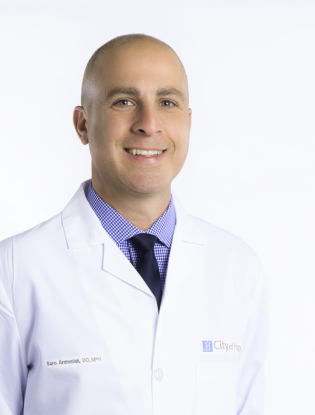Center For Survivorship And Outcomes
We are committed to lifelong follow-up of hematology patients treated at City of Hope; this includes one of the largest cohorts (more than 11,000) of long-term hematopoietic cell transplantation (HCT) survivors in active follow-up.
The center incorporates novel real-time data collection on health outcomes during and decades after completion of therapy, allowing us to understand the short-term and long-term health challenges faced by our survivors. This information is then used to inform clinicians on novel treatment strategies, risk stratification and long-term monitoring of our patients.
Highlights
- The goal of the Center for Survivorship and Outcomes is to improve the overall quality of life for survivors of hematologic (blood, bone marrow, lymph node) cancers.
-
Looking to incorporate mobile health (mHealth) technology for remote monitoring of health outcomes in long-term survivors, providing health care practitioners and researchers with real-time information on patients’ well-being. These platforms can be used for early detection of chronic disease and for implementation of interventions to avert the adverse consequences of therapy.
- Uses insights from this survivorship research to modify treatment plans for patients with blood cancers to reduce the long-term side effects of their cancer therapy
- One of the largest cohorts (>11,000) of long-term hematopoietic cell transplantation (HCT) survivors in active follow-up
Novel Approaches
Our established long-term, follow-up platform allows investigators the opportunity to implement innovative studies to understand the pathophysiology of heath complications in our patients. Specifically, we utilize state-of-the art imaging and blood biomarkers to detect health complications early on, allowing us to implement interventions to avert premature onset of cardiovascular disease, second cancers and endocrine disorders. Finally, our established blood biobank is a resource for researchers wanting to understand the role of germline risk factors in the severity and prevalence of health complications after treatment.
Patient Experience
Our overall mission is to improve the lives of our patients well beyond the immediate treatment period. Key to this mission is patient education and empowerment, providing them with information about the treatments they have received and the recommended health monitoring practices they should employ. This is done at the individual level or as part of regular patient education seminars. Ultimately, the more engaged our survivors are, the more we are able to help them achieve their full potential in the years or decades after completion of therapy.
Working for Tomorrow, Today
Our team is motivated by the knowledge that the work we do today may help the lives of patients undergoing treatment tomorrow. We are a multidisciplinary group of researchers and care providers consisting of hematologists, pharmacologists, epidemiologists, family practitioners and subspecialists, working together across a variety of research and clinical care platforms. We have an enthusiastic team of young researchers who embrace the importance of patient-centered research, treating each of our research participants with the dignity and respect they would offer to a family member. City of Hope’s core values of compassion, service with a sense of urgency, integrity, intellectual curiosity, excellence and collaboration are engrained in our culture and form the core principles that inspire us each day.
Leadership

As a physician, Saro Armenian, D.O., M.P.H., provides care to patients who are newly diagnosed with hematologic malignancies. As a researcher, he is able to facilitate the development of novel research aimed at improving the lives of patients undergoing treatment. As a physician-researcher, he is able to collaborate with clinicians and researchers at City of Hope and at medical centers throughout the country, establishing innovative studies funded by the National Institutes of Health, the Leukemia & Lymphoma Society and the American Cancer Society. The collaborative nature of this work allows rapid dissemination of knowledge that will inform healthcare providers and patients alike.